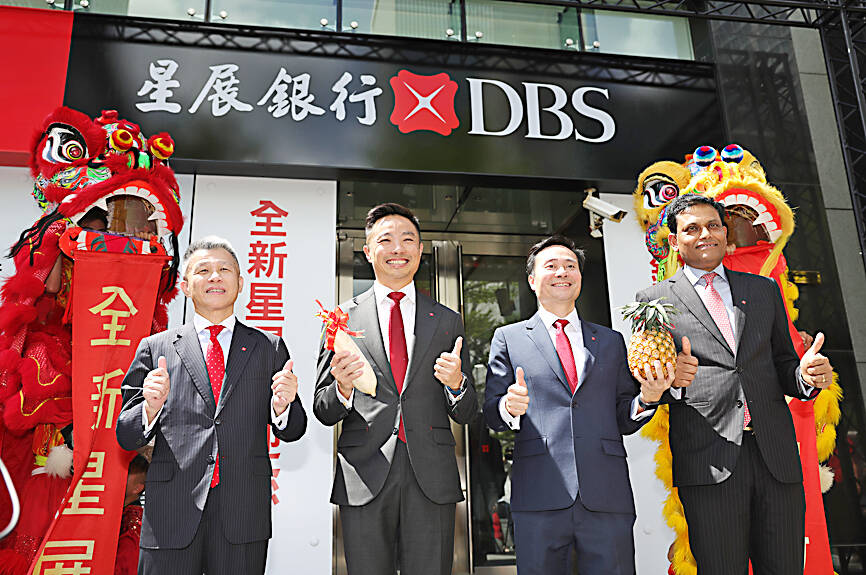DBS Bank Ltd (DBS) has completed its acquisition of Citigroup Inc’s consumer banking business in Taiwan over the weekend, it announced yesterday.
The move came as DBS seeks to augment its presence in key Asian markets where Citi is downsizing as part of a strategic refresh.
The Singaporean banking group said the transaction — including Citi’s retail banking, credit card, mortgage and unsecured lending businesses, as well as the transfer of nearly 3,000 employees — allowed it to become the largest foreign lender in Taiwan by assets.

Photo: CNA
DBS Bank Taiwan (星展台灣) now has a clear lead in loans, deposits, credit cards and investments among foreign players, the Singaporean banking group said in a statement.
Its number of consumer banking customers has more than doubled to more than 1.1 million, while total loans soared 1.5 times and deposits spiked 1.6 times, it said, adding that credit card accounts grew fivefold to more than 3 million.
DBS Group Holdings Ltd chief executive officer Piyush Gupta said that the integration of Citi Consumer Taiwan fell in line with the group’s strategy to build meaningful scale in core Asian markets.
“By bringing a prized Citi franchise into our fold, we accelerate our consumer business growth in Taiwan by at least 10 years,” Gupta said in the statement.
“We will be able to provide more value to our customers, helping them grow their wealth through innovative products, and helping business owners expand into new markets or participate in regional trade flows,” he said.
DBS Taiwan general manager Ng Sier Han (黃思翰) said he welcomed new Citi colleagues to the DBS family and described the transition as seamless.
The enlarged franchise gives the bank greater opportunity to offer best-in-class products and services to its customers, Ng said.
Citi said that its institutional client businesses in Taiwan were excluded from the sale as it remains focused on serving that segment in Taiwan.
“As we conclude the sale of our consumer business in Taiwan, we remain committed to growing our market-leading institutional franchise and supporting clients in the market and across the region through our global network,” Citi Asia Pacific CEO Peter Babej said.
Since announcing its intention to exit consumer banking across 14 markets in Asia, Europe, the Middle East and Mexico as part of its strategic refresh, Citi has signed sales agreements in nine markets and has closed sales in eight: Taiwan, Australia, Bahrain, India, Malaysia, the Philippines, Thailand and Vietnam.
Citi plans to complete the sale of its Indonesia consumer business later this year. The previously announced wind downs of Citi’s consumer business in China and South Korea and overall presence in Russia are in progress, it said in a statement.
Citi also said it would pursue an initial public offering of its consumer, small business and middle-market banking operations in Mexico, and would restart the exit process for its consumer banking business in Poland later this year, subject to market conditions.

UNCERTAINTY: Innolux activated a stringent supply chain management mechanism, as it did during the COVID-19 pandemic, to ensure optimal inventory levels for customers Flat-panel display makers AUO Corp (友達) and Innolux Corp (群創) yesterday said that about 12 to 20 percent of their display business is at risk of potential US tariffs and that they would relocate production or shipment destinations to mitigate the levies’ effects. US tariffs would have a direct impact of US$200 million on AUO’s revenue, company chairman Paul Peng (彭雙浪) told reporters on the sidelines of the Touch Taiwan trade show in Taipei yesterday. That would make up about 12 percent of the company’s overall revenue. To cope with the tariff uncertainty, AUO plans to allocate its production to manufacturing facilities in

TAKING STOCK: A Taiwanese cookware firm in Vietnam urged customers to assess inventory or place orders early so shipments can reach the US while tariffs are paused Taiwanese businesses in Vietnam are exploring alternatives after the White House imposed a 46 percent import duty on Vietnamese goods, following US President Donald Trump’s announcement of “reciprocal” tariffs on the US’ trading partners. Lo Shih-liang (羅世良), chairman of Brico Industry Co (裕茂工業), a Taiwanese company that manufactures cast iron cookware and stove components in Vietnam, said that more than 40 percent of his business was tied to the US market, describing the constant US policy shifts as an emotional roller coaster. “I work during the day and stay up all night watching the news. I’ve been following US news until 3am

COLLABORATION: Given Taiwan’s key position in global supply chains, the US firm is discussing strategies with local partners and clients to deal with global uncertainties Advanced Micro Devices Inc (AMD) yesterday said it is meeting with local ecosystem partners, including Taiwan Semiconductor Manufacturing Co (TSMC, 台積電), to discuss strategies, including long-term manufacturing, to navigate uncertainties such as US tariffs, as Taiwan occupies an important position in global supply chains. AMD chief executive officer Lisa Su (蘇姿丰) told reporters that Taiwan is an important part of the chip designer’s ecosystem and she is discussing with partners and customers in Taiwan to forge strong collaborations on different areas during this critical period. AMD has just become the first artificial-intelligence (AI) server chip customer of TSMC to utilize its advanced

Six years ago, LVMH’s billionaire CEO Bernard Arnault and US President Donald Trump cut the blue ribbon on a factory in rural Texas that would make designer handbags for Louis Vuitton, one of the world’s best-known luxury brands. However, since the high-profile opening, the factory has faced a host of problems limiting production, 11 former Louis Vuitton employees said. The site has consistently ranked among the worst-performing for Louis Vuitton globally, “significantly” underperforming other facilities, said three former Louis Vuitton workers and a senior industry source, who cited internal rankings shared with staff. The plant’s problems — which have not